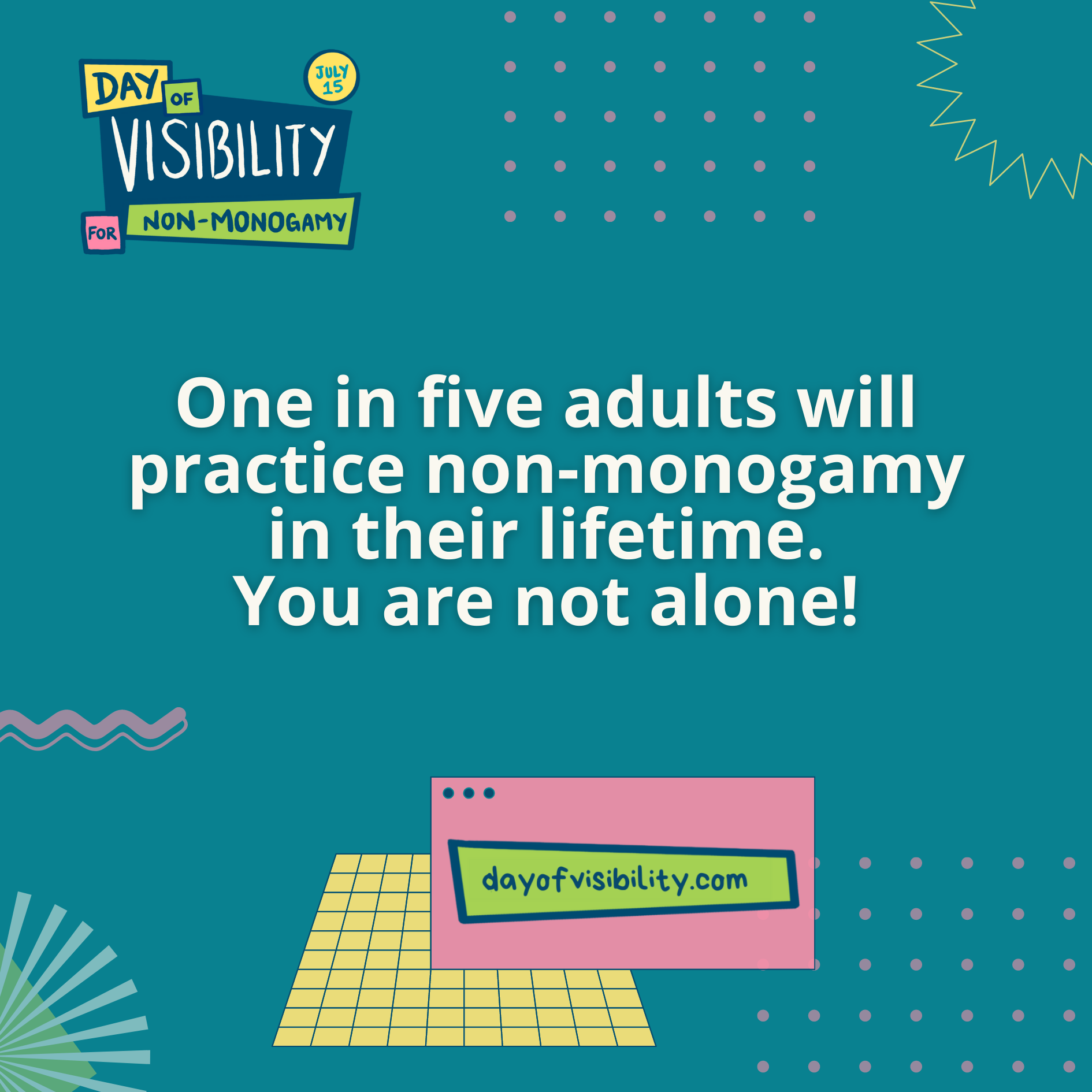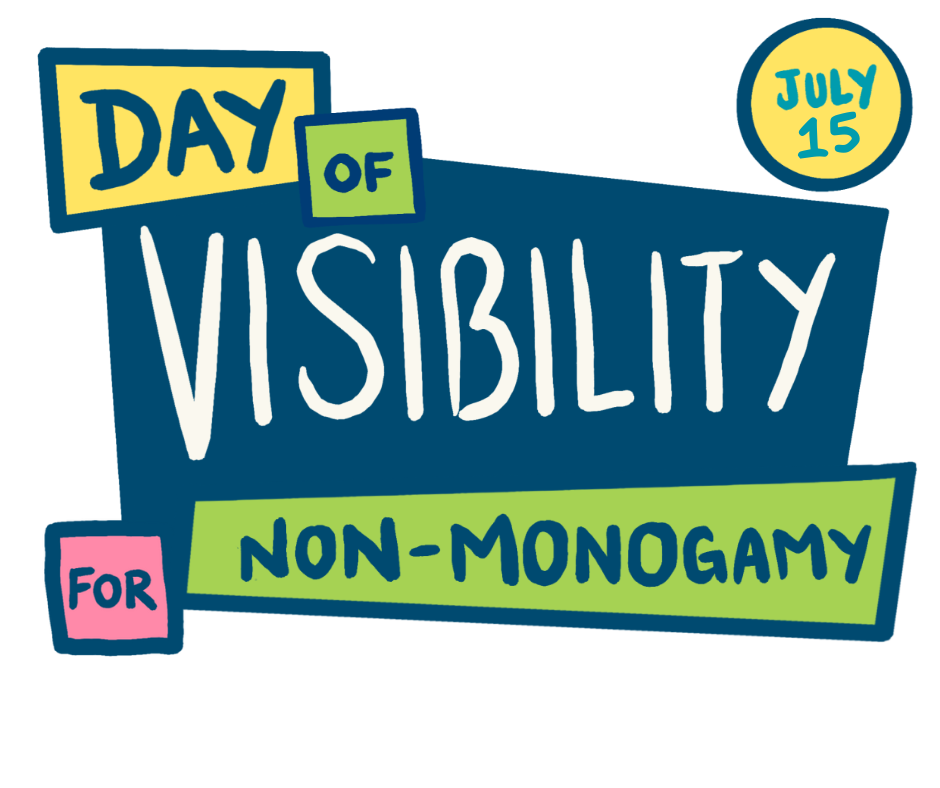This Saturday, July 15, is the inaugural Day of Visibility for non-monogamous folks.
What is non-monogamy?
The Day Of Visibility is using “Non-monogamy” as an umbrella term, including people who identify as polyamorous, “open, swinger, relationship anarchist, etc.” The non-monogamy we are lifting up on this day includes consensual relationships between adults. When I talk about non-monogamy, here, I am NOT talking about the cheating that can happen in ostensibly monogamous relationships and I am not advocating for any kind of coercive relationship
Why can’t non-monogamous folks just keep their sex lives private? Shouldn’t this stay behind bedroom doors?
Life, liberty and pursuit of happiness are phrases in the US Constitution and deeply embedded in American law. Part of that liberty protected by the constitution is the right to make personal decisions relating to intimate, adult consensual conduct and family relationships. The US supreme court in Lawrence v. Texas explicitly held that consensual sexual conduct was part of the liberty protected by the substantive due process under the Fourteenth Amendment; this case overturned a law that made same-sex intimate relationships a crime.
Relationships aren’t just about bedroom activities. Non-monogamous relationships, like monogamous ones, can of course include sexual activities. But non monogamy can also mean that people have a loving household of more than 2 adults, raising children with more than 2 nurturing caregivers, or having a range of platonic and not-so-platonic friends who live nearby and provide social support. Non-monogamous people just want to be able to live their lives like anyone else and want their relationships to just be seen as a part of who they are; we don’t want to have to *hide* our relationships for fear of the consequences.
Even in places like Texas, where adultery is not a crime that can send you to jail, non-monogamy can have serious legal consequences for the people who have these “non-traditional” relationships. Relationships with people outside of marriage can be held against you in divorce and custody proceedings (even if they are consensual and if there is no reason to believe non-monogamy affects your ability to parent). Non-monogamy isn’t a protected class (like race, sex, or religion), so employers can fire non-monogamous people and landlords can refuse to rent to non-monogamous families without getting in trouble.
Normalizing non-monogamy helps promote equal treatment of people in society and in the courtroom.

There are a lot of people practicing non-monogamy (or wanting to).
In a 2023 YouGov survey of 1000 US Citizens, only 55% of respondents answered that their “ideal relationship” is completely monogamous. 11% weren’t sure, so that leaves a staggering 34% of Americans who want some degree of non-monogamy in their lives. This lines up with the numbers on another question they asked, is polyamory moral or immoral; 53% believe that it’s morally wrong, 18% say it’s acceptable, and a whopping 29% aren’t sure.[1]
That’s a lot of people out there who know that they want some amount of non-monogamy in their relationships, but think that they’re a bad person for thinking that way.
I’m non-monogamous – should I “be visible?” Should I “come out” as open, polyamorous, swinger, relationship anarchist, etc.?
As I mentioned above – being non-monogamous can cause problems for folks in employment, housing, and family court. It may not be safe for you to be open about your non-monogamy. Diana Adams, a founding member of the Polyamory Legal Advocacy Coalition, has an excellent article on this subject that you should check out if you have any questions about whether it may or may not be safe for you to speak out. [2]
If you are more privileged and you can be open about your non-monogamy, here is why you should consider doing so.
People are more accepting of identities when they know someone in that group, so coming out lets the people around you have a reference that they can point to and say – this person is non-monogamous, and they seem like good people.
Non-monogamy is a global movement that is increasingly organizing for greater acceptance and expanded legal rights. By being open about our identities and organizing together, we can create a more open and loving world!
My story:
I decided to be open about my non-monogamy years ago. I am pretty privileged – white, middle-class, (mostly) able-bodied, straight-passing, in a respected profession, etc. I don’t have young kids (I have old kids and grandkids). I didn’t start by broadcasting the information to every person I knew – I told a few trusted friends, family, and co-workers.
The first person I told was my mom – I was married to my 1st husband and my other partner developed a serious illness; I knew I would be spending time with him and supporting him through that process and didn’t want to hide our relationship from my parents. I am lucky to have accepting family members who have embraced me and my multiple partners – there is a place at the table for both my husband and my partner at holiday gatherings.
At work I became more open about my non-monogamy when I decided to get legally married to my now-husband. My co-workers were all familiar with my partner who worked nearby and met me for lunch and attended work-related social functions with me; when I started talking about my wedding and people started to assume that I was marrying the partner they knew, I cleared up the confusion by saying “I am not marrying him, I am marrying this other guy. And, yes, partner and I are still together and plan to stay together.” My co-workers and my boss were surprised, but generally accepting. I did not get a promotion that I later applied for at that job, but I think it was more likely that I was turned down because I encouraged my co-workers to not work unpaid overtime (and the people at the top *like* getting work for free), rather than because of my non-traditional relationships.
Today, of course I really do broadcast my non-monogamy to the universe. I am happy to be able to openly serve the non-monogamous people of Texas and meet their legal needs with a view from inside the community. I am advocating for my individual clients and their families in my daily work. And I am working for broader acceptance of non-monogamy in society and in the eyes of the law in my writing and advocacy.
The lovely folks at https://www.open-love.org/ are leading the way in organizing the Nonmonogamy Day of Visibility and empowering people who live lives of consensual non-monogamy.
If you have any questions about the non-monogamy in your life and how the law may impact you people in your relationships, reach out to me at www.chosenfamilylawtx.com for a short free consultation or a longer legal coaching session.
#NonmonogamyVisibility
[1] https://docs.cdn.yougov.com/zm6jtysaa5/Monogamy_NonMonogamy_Relationships_Toplines_crosstabs.pdf
[2] https://chosenfamilylawcenter.org/safety-and-coming-out?link_id=1&can_id=1206341fb3a6354604a68078f27c4c54&source=email-one-month-til-day-of-visibility-for-non-monogamy&email_referrer=email_1958750&email_subject=one-month-til-day-of-visibility-for-non-monogamy


Recent Comments